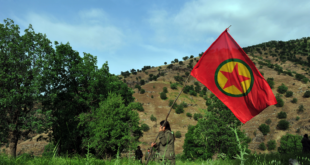Last week, the United States Congress delivered an unexpected political blow to Syria’s transitional government. The House Financial Services Committee approved a new bill—the Syria Sanctions Accountability Act of 2025—proposed by Republican Congressman Michael Lawler of New York, to revise the Caesar Syria Civilian Protection Act. Passed by a vote of 31 to 24, the bill charts a new course in U.S. punitive policy towards Syria, seeking to recalibrate sanctions enforcement by linking relief to a range of political and human rights benchmarks.
The proposed amendments extend the sanctions waiver period from 180 days to two years and outline a roadmap for full repeal by the end of 2029, contingent on tangible progress in areas such as human rights, arbitrary detention, humanitarian access, protection of infrastructure, and efforts to combat the production and trafficking of Captagon. The bill also imposes strict oversight on Syria’s central bank and requires regular reporting to Congress on anti-money laundering and counter-terrorism efforts.
Though still in its early stages and requiring further approval in both chambers of Congress before reaching President Donald Trump, the bill sends a clear dual message: Washington has yet to solidify its stance on lifting sanctions, and Syria’s new government remains under active scrutiny.
From Collapse to Conditional Support
These developments come at a critical juncture in Syria’s modern history. Since the fall of Bashar al-Assad’s regime in December 2024 and the ascent of Ahmad al-Sharaa as head of the transitional government, Syrians had dared to hope for an end to political isolation and economic devastation. That hope peaked in May 2025, when President Trump publicly pledged to lift all sanctions, describing Sharaa as a “true leader” deserving of a historic opportunity.
However, optimism quickly gave way to disillusionment. Violent clashes in Suweida between government-aligned forces and tribal factions left over 1,200 dead, including a U.S. citizen, reigniting difficult questions in Washington: Can Syria’s transitional authorities protect their population? Is it time to ease sanctions—or does international pressure remain the only credible lever for achieving genuine reform and transparent accountability?
A Shifting Sanctions Paradigm
Since its enactment in 2019, the Caesar Act has stood as a cornerstone of U.S. policy towards Syria. Named after the military defector “Caesar,” who smuggled thousands of photographs documenting systematic torture under the Assad regime, the law aimed to isolate the regime, sever its financial lifelines, and block any reconstruction that might entrench its rule.
While the law arguably hastened Assad’s downfall, it was also exploited by the regime to entrench internal repression. Today, with Assad gone, many contend the Caesar Act has outlived its purpose. Yet, the transitional government’s actions in Damascus have so far failed to justify its repeal. The debate in Washington now centres not on intentions, but on whether Syria has entered a fundamentally new phase that demands fresh political and economic tools.
Republican Senator Joe Wilson and Democratic Congresswoman Maxine Waters argue that the Caesar Act has served its mission and should be lifted to aid Syria’s economic recovery and prevent extremist resurgence. Congressman Lawler, by contrast, insists on modifying rather than eliminating the law, asserting that sanctions relief must be tied to key reforms: halting attacks on civilians, safeguarding minorities, opening prisons to international monitors, and meaningful cooperation on counterterrorism.
This divergence reflects a broader disagreement over how to interpret the transitional period. Some advocate unconditional support to ensure stability; others warn against relinquishing the limited leverage the international community retains—particularly before Syria’s new government has demonstrated a concrete capacity to deliver on its promises.
When Violence Undermines Reform
The post-Assad era was initially heralded as a rare opportunity to rebuild Syria on the foundations of citizenship, pluralism, the rule of law, and human rights. Yet this vision quickly unravelled amid a surge in sectarian violence that exposed the fragility of the nascent state and the limitations of its reformist rhetoric.
In March 2025, pro-government militias launched retaliatory attacks against Alawite civilians in the coastal provinces, killing over 1,400 people in what Syrian activists and international rights groups described as collective punishment. Similar atrocities followed in Suweida, where clashes with Bedouin tribes escalated into massacres. State-aligned forces were implicated in summary executions, hospital raids, and targeted killings of Druze families.
Both Alawite and Druze communities—despite their differing political roles and historical affiliations—were drawn into a vortex of sectarian retribution. Alawites, long linked to Assad-era power structures, bore the burden of the regime’s legacy. Druze, initially supportive of the transitional government, grew disillusioned as state and allied militias acted with impunity.
In both instances, the dream of pluralism gave way to a harsher reality: emerging authorities appeared more interested in constructing a monolithic state than fostering inclusive governance. With the government either unable or unwilling to rein in rogue militias, minority communities were once again left exposed—unprotected, and unacknowledged.
Justice Deferred, Accountability Denied
The fact-finding commission appointed by President Sharaa to investigate the coastal massacres only deepened public outrage. Its report—widely seen as an attempt to shield pro-government security agencies—failed to establish command responsibility, instead attributing the violence to unnamed individuals who had “disobeyed orders” within unspecified groups. While the report confirmed the deaths of 1,426 Alawite civilians, it neglected the organised and coordinated nature of the attacks.
Only two cases were referred to the public prosecutor—both targeting alleged remnants of the former regime, thereby reinforcing the narrative that the atrocities were isolated rather than state-sanctioned. Justice, in this context, became a tool for denial rather than redress. The commission’s function appeared not to address public anger, but to absorb and deflect it.
This failure further eroded U.S. confidence in the transitional government’s ability to uphold basic standards of accountability. Following the Suweida massacres, White House spokesperson Karoline Leavitt stated that the administration was “monitoring the situation closely,” attributing the eventual ceasefire to direct American intervention. Though diplomatic in tone, her comments reflected a growing concern in Washington that lifting sanctions without safeguards could embolden impunity rather than strengthen the transition.
Sanctions, Governance, and Conditional Relief
While Syria’s economic collapse is often attributed solely to sanctions, the deeper truth is more complex. External pressure plays a role, but the absence of good governance, security, and functioning institutions is equally—if not more—damaging.
In this context, the rationale behind Congressman Lawler’s bill appears more sound. It acknowledges the need for sanctions relief but insists it be contingent upon measurable reforms. Unconditional lifting would amount to rewarding optics over substance.
Even humanitarian experts such as Stephen Rapp of the Syrian Emergency Task Force oppose a full repeal of the Caesar Act, despite acknowledging its limitations. In their view, sanctions have evolved from a tool to isolate Assad into a mechanism for protecting Syria’s fragile transition.
The Biden administration has outlined five official conditions for lifting sanctions entirely:
Accession to the Abraham Accords and normalisation with Israel;
Dismantling Captagon production and trafficking networks;
Resolution of the foreign fighters issue, including Hezbollah and Palestinian factions;
Cooperation in preventing the resurgence of ISIS and assuming responsibility for ISIS detainees;
A genuine commitment to protecting all segments of Syrian society.Alongside these formal stipulations, a set of well-known informal expectations continue to shape Washington’s stance. These include: ensuring unrestricted humanitarian access, particularly in opposition-held areas; prosecuting war crimes and human rights violations, including those committed during the transition; dismantling Assad-era intelligence institutions; holding internationally supervised democratic elections; enabling the safe, voluntary return of refugees; and severing military ties with Iran, including closing Iranian bases and expelling its advisors.
A Government on Trial
These conditions are not always presented as a fixed, unified package. Their implementation may vary with the shifting political climate in Washington or the temperament of President Trump and his advisers. Some are advanced through Congress, others via the State or Treasury Departments, reflecting the fragmented nature of U.S. policymaking. Yet, for all their perceived gravity, these conditions are not insurmountable. They can be interpreted as a roadmap—offering Syria’s transitional government an opportunity to demonstrate its capacity to build a more just and representative order.
Still, the most formidable challenges lie within. President Sharaa, whose political roots are grounded in a conservative Islamist tradition, has yet to provide concrete assurances to the country’s minority communities—particularly Alawites, Druze, and Christians. His administration’s rhetoric oscillates between inclusive national symbolism and exclusionary factionalism, undermining trust in its vision for Syria’s future.
Ultimately, the question of U.S. sanctions transcends the confines of foreign policy. It is intimately tied to the fate of the Syrian state itself. The core issue is not simply whether sanctions should be lifted or maintained, but which path Syria intends to pursue: one towards a pluralistic, democratic society that restores trust, or one that recycles authoritarianism under a different guise.
The window that opened following Assad’s fall offered a fleeting moment of promise. That window is now narrowing, obscured by massacres, political ambiguity, and institutional silence. Washington has articulated its expectations—some explicit, others implicit—but the transitional government has yet to meet even the most fundamental benchmarks for justice, security, and inclusivity.
Sanctions, by their nature, are blunt instruments of collective punishment that often exacerbate civilian suffering. Syria’s experience offers a stark testimony to that reality. Yet the crisis runs deeper than sanctions alone. At its core lies Syria’s repeated failure to construct a state capable of upholding dignity, rights, and a shared national identity.
Many of Washington’s demands—such as minority protections and accountability for atrocities—are inherently just. However, in practice, they also contribute to sustaining a sanctions regime whose outcomes have been, at best, uneven. What began as a tool of pressure has evolved into an end in itself: a symbolic economic weapon wielded in the name of lofty, though selectively applied, human rights ideals.
A genuine solution demands, first and foremost, the removal of unjust sanctions. But that step alone is insufficient. It must be accompanied by international diplomacy and internal reforms that lay the groundwork for a truly democratic order. Without such foundations, sanctions will remain not only an external burden—but may also become, in their enduring bitterness, the final obstacle to preventing Syria from descending into yet another cycle of violence and exclusion.
Unless Syria’s new leadership succeeds in transforming the state into a genuine home for all its citizens, no handshake between Sharaa and Trump, no congratulatory tweet from Washington, and no promises from a cautious administration will amount to lasting change. The international community may extend opportunity after opportunity—but it offers no free lunches, nor does it build nations in place of their people.
 Eurasia Press & News
Eurasia Press & News




